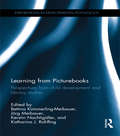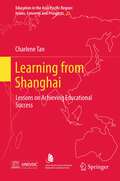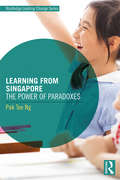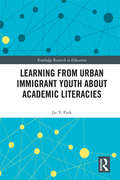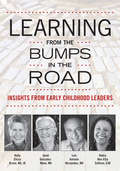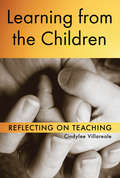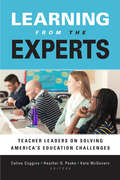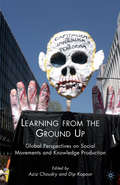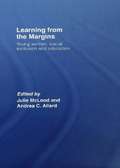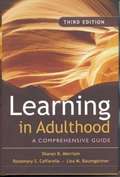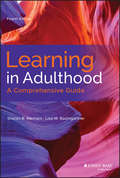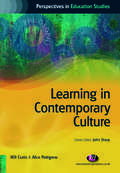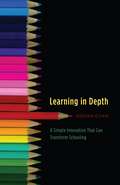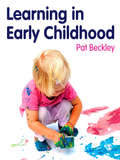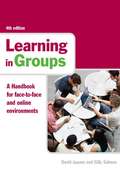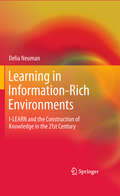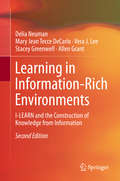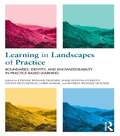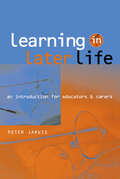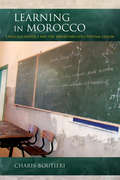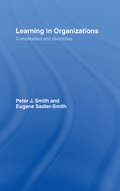- Table View
- List View
Learning from Picturebooks: Perspectives from child development and literacy studies (Explorations in Developmental Psychology)
by Bettina Kümmerling-Meibauer Jörg Meibauer Kerstin Nachtigäller Katharina J. RohlfingPicturebooks, understood as a series of meaningful text-picture relations, are increasingly acknowledged as an autonomous sub-genre of children’s literature. Being highly complex aesthetic products, their use is deeply embedded in specific situations of joint attention between a caregiver and a child. This volume focuses on the question of what children may learn from looking at picturebooks, whether printed in a book format, created in a digital format, or self-produced by educationalists and researchers.Interest in the relationship between cognitive processes and children’s literature is growing rapidly, and in this book, theoretical frameworks such as cognitive linguistics, cognitive narratology, cognitive poetics, and cognitive psychology, have been applied to the analysis of children’s literature. Chapters gather empirical research from the fields of literary studies, linguistics and cognitive psychology together for the first time to build a cohesive understanding of how picturebooks assist learning and development.International contributions explore: language acquisition the child’s cognitive development emotional development literary acquisition ("literary literacy") visual literacy. Divided into three parts considering symbol-based learning, co-constructed learning, and learning language skills, this cross-disciplinary volume will appeal to researchers, students and professionals engaged in children’s literature and literacy studies, as well as those from the fields of cognitive and developmental psychology, linguistics, and education.
Learning from Shanghai: Lessons on Achieving Educational Success (Education in the Asia-Pacific Region: Issues, Concerns and Prospects #21)
by Charlene TanThe Shanghai school system has attracted worldwide attention since its impressive performance in the International Programme for Student Assessment (PISA) in 2009. The system ranks as a 'stunning success' according to standards of the Organisation for Economic Co-operation and Development (OECD). Shanghai also stands out for having the world's highest percentage of 'resilient students' - students from socio-economically disadvantaged backgrounds who emerge as top performers. Learning From Shanghai: Lessons on Educational Success offers a close-up view of the people and the policies that have achieved such world-class performance. Based on research and personal observation gathered during the author's recent field work with school principals, teachers and students, this book explores the factors that explain Shanghai's exceptional success in education. The approach combines high standards of scholarly research and analysis with the author's unique personal insights, as evidenced by chapters entitled Education is Filling a Bucket and Lighting a Fire and Tiger Mothers, Dragon Children. Drawing on her experience as an education professional and a teacher of teachers, Charlene Tan thoroughly examines and analyzes the people, the policies and the practices that distinguish Shanghai educators. The contents include comprehensive details on the Shanghai approach to quality education, from discussion of the balance between centralization and decentralization, to school autonomy and accountability, to testing policy and professional development for teachers. The book includes detailed tables on curriculum and school performance targets, sample appraisal forms for teachers and students, and dozens of photographs. The author is an Associate Professor at the National Institute of Education, Nanyang Technological University, Singapore.
Learning from Singapore: The Power of Paradoxes (Routledge Leading Change Series)
by Pak Tee NgLearning from Singapore tells the inside story of the country’s journey in transforming its education system from a struggling one to one that is hailed internationally as effective and successful. It is a story not of the glory of international test results, but of the hard work and tenacity of a few generations of policy makers, practitioners and teacher trainers. Despite its success, Singapore continues to reform its education system, and is willing to deal with difficult issues and challenges of change. Citing Singapore's transformation, author Pak Tee Ng highlights how context and culture affect education policy formulation and implementation. Showing how difficult education reform can be when a system needs to negotiate between competing philosophies, significant trade-offs, or paradoxical positions, this book explores the successes and struggles of the Singapore system and examines its future direction and areas of tension. The book also explores how national education systems can be strengthened by embracing the creative tensions generated by paradoxes such as the co-existence of timely change and timeless constants, centralisation and decentralisation, meritocracy and compassion, and teaching less and learning more. Learning from Singapore brings to the world the learning from Singapore—what Singapore has learned from half a century of educational change—and encourages every education system to bring hope to and secure a future for the next generation.
Learning from Urban Immigrant Youth About Academic Literacies (Routledge Research in Education #20)
by Jie Y. ParkThis book reports on a two-year long, qualitative literacy case study of the academic literacies of first and second-generation immigrant youth in an afterschool tutoring program in South Bronx, New York. Through transcripts of tutoring sessions, interview data, and youths’ written work, each chapter highlights how youth interpreted and navigated various school assignments, and what resources and perspectives they brought to unpacking the meaning and significance of texts and disciplinary discourses. By focusing on the immigrant youth themselves, and not on the teaching that happens (or does not happen) inside classrooms, this volume provides a unique and much-needed vantage point to understanding the academic literacies and engagement of urban immigrant youth.
Learning from the Bumps in the Road
by Janet Gonzalez-Mena Holly Elissa Bruno Luis A. Hernandez Ed.D. Debra Ren-Etta SullivanThe journey to professional and personal growth takes time, and the road isn't always smooth, but it is a learning-filled adventureHolly Elissa Bruno, Janet Gonzalez-Mena, Luis Antonio Hernandez, and Debra Ren-Etta Sullivan are accomplished professionals and respected leaders in the early childhood field. After a decade of speaking together at national professional development conferences, they now give you twelve of their most important presentation topics as essays. Each chapter presents a dialogue among the authors about a particular topic and the lessons gleaned from facing and overcoming uncertainty and obstacles.Merging each author's distinct voice, expertise, and life experiences, this collection unveils the authors' personal and meaningful histories, insecurities, and insights. You will be encouraged and challenged to think more deeply and openly about your own practices and philosophies. You will gain a renewed sense of purpose as you help children reach their full potentials. And you will discover-as the authors did-that every bump in the road is an invitation to grow and opportunity to learn.Holly Elissa Bruno, MA, JD; Janet Gonzalez-Mena, MA; Luis Antonio Hernandez, MA; and Debra Ren-Etta Sullivan, EdD, are acclaimed keynote speakers, authors, and experts on a variety of topics in early childhood.
Learning from the Children
by Cindylee VillarealeAs an early childhood professional, teaching young children is an important function of your job. You may not realize, however, that time spent teaching children results in learning opportunities of your own. This collection of heartening classroom stories reflects the change, growth, and learning that happens when teachers take time to learn from children. Lessons shared are centered on themes of being the best teacher you can be, helping children feel special, and helping children learn in new ways. Each story is followed by the author's personal reflection on the event and the lasting impact it made. You are invited to apply these stories to your own experiences as you realize the influence children have on your life. These touching narratives will encourage, support, and challenge you to be a better person-both at home and in the classroom. Learning from the Children is an inspiring reminder that some of the biggest lessons come from the smallest teachers.
Learning from the Experts: Teacher Leaders on Solving America's Education Challenges
by Kate Mcgovern Heather G. Peske Celine Coggins"Securing a world-class education for our students demands the contribution of a world-class teaching force. This volume contributes to this goal. Learning from the Experts captures the insights and ingenuity of our best and brightest teachers. The essays presented in these pages bolster my conviction that teachers can be architects of a stronger educational future."--Mitchell D. Chester, commissioner of elementary and secondary education, Massachusetts"Learning from the Experts should be required reading for policy makers, school officials, and would-be reformers who imagine that they can save public education. Our schools will be in good hands if teachers like these inspire more teachers like these to speak out and step up."--Susan Moore Johnson, Jerome T. Murphy Professor of Education, and director, The Project on the Next Generation of Teachers, Harvard Graduate School of Education"This book highlights the lessons we can learn from our very own teachers in the realm of best policy and practice. In doing so, it elevates the status of teaching as a profession. Learning from the Experts is a celebration of collaboration for the betterment of teachers and the students they serve."--John E. Deasy, superintendent, Los Angeles Unified School DistrictIn Learning from the Experts, emerging teacher leaders--in dialogue with seasoned leaders--offer an intimate look at the ways education policies collide with everyday classroom practices. This lively collection of essays illustrates how thoughtful, solutions-oriented and results-driven teachers are reframing debates in education today.
Learning from the Experts: Teacher Leaders on Solving America's Education Challenges
by Celine Coggins, Heather G. Peske, and Kate McGovernLearning from the Experts offers an intimate look at the ways education policies collide with everyday classroom practices and illustrates how thoughtful, solutions-oriented and results-driven teachers are reframing debates in education today. Early career teachers now make up a &“new majority&” (52 percent) of the workforce. Their ideas about the profession are often radically different from the previous generation&’s but are not often heard in education reform. Learning from the Experts draws on the work of the nonprofit organization Teach Plus to address this divide. In this lively collection, emerging teacher leaders in dialogue with seasoned leaders weigh in on the most difficult challenges in education today. Topics include the appropriate use of data, teacher effectiveness, retaining talented teachers in high-needs schools, reforming teacher unions, supporting teacher leadership, and strengthening the teaching profession itself.
Learning from the Ground Up
by Aziz Choudry Dip KapoorThe dynamics, politics, and richness of knowledge production in social movements and social activist contexts are often overlooked. This book contends that some of the most radical critiques and understandings about dominant ideologies and power structures, and visions of social change, have emerged from those spaces.
Learning from the Margins: Young Women, Social Exclusion and Education
by Julie McLeod Andrea C. AllardThis collection of ground-breaking international essays address the educational, social, work and biographical experiences of young women who are routinely constructed as ‘at risk’ and on the margins. Drawing on research from an international range of scholars, this book brings together important new perspectives on the gendered dimensions of social exclusion and educational marginalisation. It offers practitioners as well as researchers insights into how to ‘research’ social marginalisation and reflections on projects and programmes that have attempted to do so. Chapters investigate key topics such as: early school leaving indigenous young women and schooling pregnant and parenting young women at school constructions of health, subjectivity and social class the politics of ethnicity. Provocative and insightful, this book will make interesting reading to students and post-graduate students of education, youth studies, gender studies, sociology and social work.
Learning how to learn
by Joseph D. Novak D. Bob GowinFor almost a century, educational theory and practice have been influenced by the view of behavioural psychologists that learning is synonymous with behaviour change. In this book, the authors argue for the practical importance of an alternate view, that learning is synonymous with a change in the meaning of experience. They develop their theory of the conceptual nature of knowledge and describe classroom-tested strategies for helping students to construct new and more powerful meanings and to integrate thinking, feeling, and acting. In their research, they have found consistently that standard educational practices that do not lead learners to grasp the meaning of tasks usually fail to give them confidence in their abilities. It is necessary to understand why and how new information is related to what one already knows. All those concerned with the improvement of education will find something of interest in Learning How to Learn.
Learning in Adulthood: A Comprehensive Guide (3rd Edition)
by Sharan B. Merriam Rosemary S. Caffarella Lisa M. Baumgartner"This third edition of Learning in Adulthood is substantially reorganized from the previous edition. This edition is divided into four parts. Part One describes the context of adult learning. Part Two focuses on theories and models of adult learning. The chapters in Part Three address newer approaches to adult learning, and those in Part Four present material on topics that intersect with adult learning, such as memory and cognition, adult development, and so on.
Learning in Adulthood: A Comprehensive Guide (Wiley Desktop Editions Ser.)
by Sharan B. Merriam Lisa M. BaumgartnerThe new edition of the authoritative book in the field of adult education — fully revised to reflect the latest research and practice implications. For nearly three decades, Learning in Adulthood has been the definitive guide in the field of adult education. Now in its fourth edition, this comprehensive volume is fully revised to reflect the latest developments in theory, research, and practice. The authors integrate foundational research and current knowledge to present fresh, original perspectives on teaching and learning in adulthood. Written by internationally-recognized experts, this market-leading guide draws from work in sociology, philosophy, critical social theory, psychology, and education to provide an inclusive overview of adult learning. Designed primarily for educators of adults, this book is accessible for readers new to adult education, yet suitably rigorous for those more familiar with the subject. Content is organized into four practical parts, covering topics such as the social context of adult learning, self-directed and transformational learning, postmodern and feminist perspectives, cognitive development in adulthood, and more. Offering the most comprehensive single-volume treatment of adult learning available, this landmark text: Offers a wide-ranging perspective on adult learning Synthesizes the latest thinking and work in the field Includes coverage of the sociocultural perspectives of adult learning Explores the broader social implications of adult education Learning in Adulthood: A Comprehensive Guide, 4th Edition is an indispensable resource for educators and administrators involved in teaching adults, as well as faculty and students in graduate programs in adult education.
Learning in Contemporary Culture (Perspectives in Education Studies Series)
by Will Curtis Alice PettigrewThis book provides an accessible undergraduate-level introduction to the central educational concepts of learning and culture. In examining these themes it addresses key issues including: what is meant by ′culture′; characteristics commonly associated with contemporary culture; relationships between culture and learning; changing understandings of how, what, where and when we learn; the relationship between learning, national identity and citizenship; and the impact of all these on our way of life today. These ideas are approached from historical, philosophical, sociological, political and psychological perspectives: the traditional disciplines of Education Studies.
Learning in Depth: A Simple Innovation That Can Transform Schooling
by Kieran EganFor generations, schools have aimed to introduce students to a broad range of topics through curriculum that ensure that they will at least have some acquaintance with most areas of human knowledge by the time they graduate. Yet such broad knowledge can’t help but be somewhat superficial—and, as Kieran Egan argues, it omits a crucial aspect of true education: deep knowledge. Real education, Egan explains, consists of both general knowledge and detailed understanding, and in Learning in Depth he outlines an ambitious yet practical plan to incorporate deep knowledge into basic education. Under Egan’s program, students will follow the usual curriculum, but with one crucial addition: beginning with their first days of school and continuing until graduation, they will eachalso study one topic—such as apples, birds, sacred buildings, mollusks,circuses, or stars—in depth. Over the years, with the help and guidance of their supervising teacher, students will expand their understanding of their one topic and build portfolios of knowledge that grow and change along with them. By the time they graduate each student will know as much about his or her topic as almost anyone on earth—and in the process will have learned important, even life-changing lessons about the meaning of expertise, the value of dedication, and the delight of knowing something in depth. Though Egan’s program may be radical in its effects, it is strikingly simple to implement—as a number of schools have already discovered—and with Learning in Depth as a blueprint, parents, educators, and administrators can instantly begin taking the first steps toward transforming our schools and fundamentally deepening their students’ minds.
Learning in Depth: A Simple Innovation That Can Transform Schooling
by Kieran EganFor generations, schools have aimed to introduce students to a broad range of topics through curriculum that ensure that they will at least have some acquaintance with most areas of human knowledge by the time they graduate. Yet such broad knowledge can’t help but be somewhat superficial—and, as Kieran Egan argues, it omits a crucial aspect of true education: deep knowledge.Real education, Egan explains, consists of both general knowledge and detailed understanding, and in Learning in Depth he outlines an ambitious yet practical plan to incorporate deep knowledge into basic education. Under Egan’s program, students will follow the usual curriculum, but with one crucial addition: beginning with their first days of school and continuing until graduation, they will eachalso study one topic—such as apples, birds, sacred buildings, mollusks,circuses, or stars—in depth. Over the years, with the help and guidance of their supervising teacher, students will expand their understanding of their one topic and build portfolios of knowledge that grow and change along with them. By the time they graduate each student will know as much about his or her topic as almost anyone on earth—and in the process will have learned important, even life-changing lessons about the meaning of expertise, the value of dedication, and the delight of knowing something in depth.Though Egan’s program may be radical in its effects, it is strikingly simple to implement—as a number of schools have already discovered—and with Learning in Depth as a blueprint, parents, educators, and administrators can instantly begin taking the first steps toward transforming our schools and fundamentally deepening their students’ minds.
Learning in Doing: Constructing Dynamic Triangles Together
by Gerry StahlRational thinking as exemplified in mathematical cognition is immensely important in the modern world. This book documents how a group of three eighth-grade girls developed specific group practices typical of such thinking in an online educational experience. A longitudinal case study tracks the team through eight hour-long sessions, following the students' meaning-making processes through their mutual chat responses preserved in computer logs coordinated with their geometric actions. The examination of data focuses on key areas of the team's development: its effective team collaboration, its productive mathematical discourse, its enacted use of dynamic-geometry tools, and its ability to identify and construct dynamic-geometry dependencies. This detailed study of group cognition serves as a paradigmatic example of computer-supported collaborative learning, incorporating a unique model of human-computer interaction analysis applied to the use of innovative educational technology. A valuable resource for researchers, instructors, and students alike, it offers concrete suggestions for improving educational practice.
Learning in Early Childhood: A Whole Child Approach from birth to 8
by Pat BeckleyBy explaining the theoretical context and highlighting relevant research evidence, this book supports a whole child approach to learning in the early years. Drawing on case studies from a wide range of early years settings, the chapters consider how the different professions in education, health and social care can work together to achieve the best possible outcomes for all young children. Included are chapters on: ·theories of learning ·partnerships with parents and carers ·motivation and self-esteem ·diversity ·inclusion ·thinking skills ·approaches to play ·engaging early learners ·leadership and management ·multi-agency working The links made between theory and practice, and the practical suggestions for how to make this happen in any early years setting, make this book a vital text for all early years students.
Learning in Groups: A Handbook for Face-to-Face and Online Environments
by David Jaques Gilly SalmonLearning in groups, rather than in formal lectures or presentations, allows students to have greater scope to negotiate meaning and express themselves and their own ideas. It also helps them to establish far more effective releationships, not only with their tutors and trainers but with each other. Yet many tutors and trainers find the leadership role required when working in groups difficult to perform satisfactorily and revert to their traditional role as subject expert and prime talker. This handbook is a truly comprehensive guide for anyone involved in groupwork, containing advice and practical exercises to develop group learning skills for both learners and tutors. This new edition has been thoroughly updated, containing valuable new material throughout on group learning and collaborating online, action research and the role of reflection and emotional intelligence.
Learning in Information-Rich Environments
by Delia NeumanThe amount and range of information available to today's students--and indeed to all learners--is unprecedented. Phrases like "the information revolution", "the information (or knowledge) society", and "the knowledge economy" underscore the truism that our society has been transformed by virtually instantaneous access to virtually unlimited information. Thomas Friedman tells us that "The World Is Flat" and that we must devise new political and economic understandings based on the ceaseless communication of information from all corners of the world. The Bush administration tells us that information relating to the "war on terrorism" is so critical that we must allow new kinds of surveillance to keep society safe. Teenage subscribers to social-computing networks not only access information but enter text and video images and publish them widely--becoming the first adolescents in history to be creators as well as consumers of vast quantities of information. If the characteristics of "the information age" demand new conceptions of commerce, national security, and publishing--among other things--it is logical to assume that they carry implications for education as well. In fact, a good deal has been written over the last several decades about how education as a whole must transform its structure and curriculum to accommodate the possibilities offered by new technologies. Far less has been written, however, about how the specific affordances of these technologies--and the kinds of information they allow students to access and create--relate to the central purpose of education: learning. What does "learning" mean in an information-rich environment? What are its characteristics? What kinds of tasks should it involve? What concepts, strategies, attitudes, and skills do educators and students need to master if they are to learn effectively and efficiently in such an environment? How can researchers, theorists, and practitioners foster the well-founded and widespread development of such key elements of the learning process? This book explores these questions and suggests some tentative answers. Drawing from research and theory in three distinct but related fields--learning theory, instructional systems design, and information studies--it presents a way to think about learning that responds directly to the actualities of a world brimming with information. The book is grounded in the work of such key figures in learning theory as Bransford and Anderson & Krathwohl. It draws on such theorists of instructional design as Gagne, Mayer, and Merrill. From information studies, it uses ideas from Buckland, Marchionini, and Wilson (who is known for his pioneering work in "information behavior"--that is, the full range of information seeking and use). The book breaks new ground in bringing together ideas that have run in parallel for years but whose relationship has not been fully explored.
Learning in Information-Rich Environments: I-LEARN and the Construction of Knowledge from Information
by Delia Neuman Mary Jean Tecce DeCarlo Vera J. Lee Stacey Greenwell Allen GrantThe amount and range of information available to today’s students—and indeed to all learners—is unprecedented. If the characteristics of “the information age” demand new conceptions of commerce, national security, and publishing—among other things—it is logical to assume that they carry implications for education as well. Little has been written, however, about how the specific affordances of these technologies—and the kinds of information they allow students to access and create—relate to the central purpose of education: learning. What does “learning” mean in an information-rich environment? What are its characteristics? What kinds of tasks should it involve? What concepts, strategies, attitudes, and skills do educators and students need to master if they are to learn effectively and efficiently in such an environment? How can researchers, theorists, and practitioners foster the well-founded and widespread development of such key elements of the learning process? This second edition continues these discussions and suggests some tentative answers. Drawing primarily from research and theory in three distinct but related fields—learning theory, instructional systems design, and information studies—it presents a way to think about learning that responds directly to the actualities of a world brimming with information. The second edition also includes insights from digital and critical literacies and provides a combination of an updated research-and-theory base and a collection of instructional scenarios for helping teachers and librarians implement each step of the I-LEARN model. The book could be used in courses in teacher preparation, academic-librarian preparation, and school-librarian preparation.
Learning in Landscapes of Practice: Boundaries, identity, and knowledgeability in practice-based learning
by Etienne Wenger-Trayner, Mark Fenton-O’Creevy, Steven Hutchinson, Chris Kubiak, and Beverly Wenger-TraynerIf the body of knowledge of a profession is a living landscape of practice, then our personal experience of learning can be thought of as a journey through this landscape. Within Learning in Landscapes of Practice, this metaphor is further developed in order to start an important conversation about the nature of practice knowledge, identity and the experience of practitioners and their learning. In doing so, this book is a pioneering and timely exploration of the future of professional development and higher education. The book combines a strong theoretical perspective grounded in social learning theories with stories from a broad range of contributors who occupy different locations in their own landscapes of practice. These narratives locate the book within different contemporary concerns such as social media, multi-agency, multi-disciplinary and multi-national partnerships, and the integration of academic study and workplace practice. Both scholarly, in the sense that it builds on prior research to extend and locate the concept of landscapes of practice, and practical because of the way in which it draws on multiple voices from different landscapes. Learning in Landscapes of Practice will be of particular relevance to people concerned with the design of professional or vocational learning. It will also be a valuable resource for students engaged in higher education courses with work-based elements.
Learning in Later Life: An Introduction for Educators and Carers
by Peter JarvisAn analysis of learning throughout the whole of life. Written as a text for both educators and carers, it demonstrates how the learning process works through life and how learning at all stages of life is best achieved.
Learning in Morocco: Language Politics and the Abandoned Educational Dream
by Charis BoutieriLearning in Morocco offers a rare look inside public education in the Middle East. While policymakers see a crisis in education based on demographics and financing, Moroccan high school students point to the effects of a highly politicized Arabization policy that has never been implemented coherently. In recent years, national policies to promote the use of Arabic have come into conflict with the demands of a neoliberal job market in which competence in French is still a prerequisite for advancement. Based on long-term research inside and outside classrooms, Charis Boutieri describes how students and teachers work within, or try to circumvent, the system, whose contradictory demands ultimately lead to disengagement and, on occasion, to students taking to the streets in protest.
Learning in Organizations: Complexities and Diversities
by Eugene Sadler-Smith Peter J SmithTaking a fresh and innovative approach to the complexities and challenges inherent in organizational learning diversity, the authors show that there are no generic solutions. They argue there is no 'best way' of planning, organizing and implementing learning in relation to the workplace and instead provide context-specific solutions to the dilemmas and issues that diversities present. With an international approach, grounded in theory and incorporating strong practical examples, this book is essential reading for all those studying, teaching or practising human resource development, human resource management or professional education.
